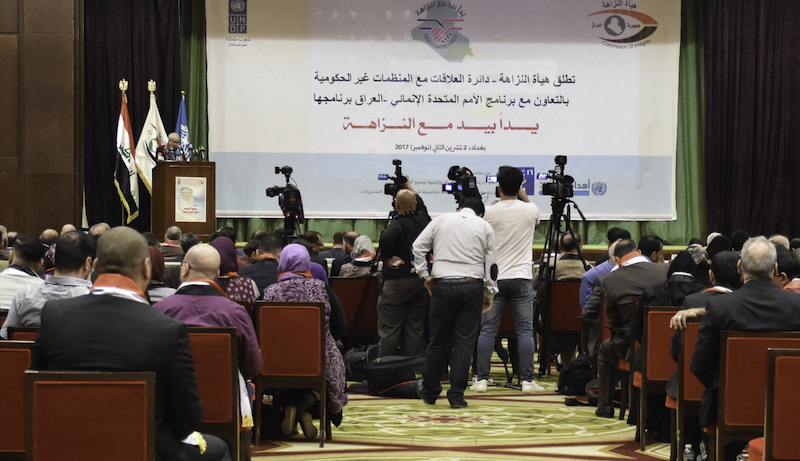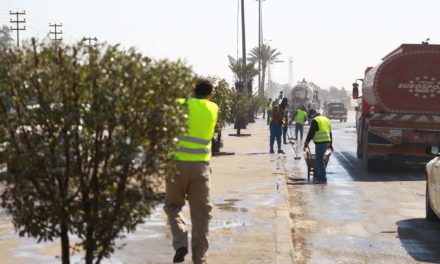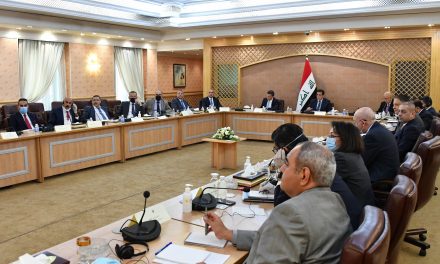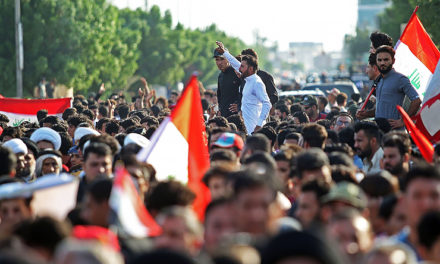(Photo: Israa Mansour/UNDP)
Iraq’s Commission of Integrity (COI) issued its annual report, highlighting its activities throughout 2018. The report is a valuable tool giving insight on how things are run in the commission, and an overall outline on the state of integrity in the country.
The three most significant institutions in which COI found conflicts of interest in are the Ministry of Defense, Ministry of Interior and Parliament after examining their financial decelerations. Without a doubt, shady transactions in the security apparatus of a country with an ongoing security crisis should worry policymakers. On top of that, a parliament with corrupt MPs is not expected to take effective measures against corruption.
The data in the report also shows that the Ministry of Construction, Housing, Municipalities, and Public Works has a major problem with corruption given the large number of reports received by COI. The ministry received 741 complaints in 2018, followed by the Ministry of Finance with 652 and the Ministry of Justice with 502 complaints each. With the Ministry of Construction festered with corruption, it is no surprise that there are crises in essential services like housing projects, sewage channels, and roads. Furthermore, it is a given that Iraq has a corruption crisis when the Ministry of Finance and the Ministry of Justice, the two supposed bulwarks against corruption, have become a symbol of it.
Nevertheless, it becomes clear quite quickly to the reader that while COI has been quite busy last year, the outcome of its efforts miserably fall short in front of the challenge of corruption in Iraq.
It starts with the simple fact that while the COI report has a section highlighting its mutual efforts with the international community to combat corruption in the country, a timely and unabridged English report on COI’s activities is not available. This means that the international community which is invested in the situation of corruption in Iraq is denied an important communication tool.
Furthermore, as is the case with other organizations in Iraq, there is a huge failure in applying strategic planning requirements. The COI vision, the most essential part in any strategy formulation process, reads as the following:
“An auditory apparatus that has legal authority allowing it to craft strategies to combat corruption, eradicate its origin, and deter corrupt individuals by adopting the principles of transparency and respect for human rights.”
Any university student who has passed an introductory course to strategic management can tell that this is not a vision, but definition and purpose of the organization, stating what it is and what it does. Visions on the other hand are an important part of the strategic planning process that focuses on what the organization wants to achieve in a given time. It has to be specific and motivate the organization members to realize the future state described in it. Without getting the vision statement right, COI denies itself an important tool to rally external support and provide a source of inspiration for its employees.
The data regarding COI’s effort is telling how the organization is operating. The reports show that COI receives a lot of input and potential cases from different areas within the state, but the output is incredibly weak.
At the bottom-line of all its effort, 1218 convictions against potentially corrupt individuals have been issued by the courts, with 7 cases against minister-level officials, 49 against director general levels, and the rest all lower-level employees. This indicates that COI is busy with small-calibre corruption cases and not tackling the bigger ones. This conclusion is supported with the fact that the amount of returned misappropriated funds is as low as $150 million. Furthermore, amongst those convicted, only 909 individuals where present in Iraq while 309 were sentenced in absentia, meaning that these individuals are free and still pose a potential risk by either running or supporting corruption rings from abroad. Comparing these numbers with the 11,666 cases brought forward by COI (each individual can receive several counts of accusations) this is an incredibly slow and weak performance.
Instead, COI is heavily engaged in other supportive activities. The report shows a massive number of workshops and training sessions for its employees. While education is essential in COI’s work, what this organization needs more are people who have majored in areas related to combating corruption, like forensic accounting, financial criminology, and international law, with both local and international experience. Specializations like these are currently not available in Iraqi universities and no amount of workshops and training sessions can compensate for that. The lack of specialists is one of the major contributors to the lack of performance in COI.
Additionally, a large chunk of COI’s effort is wasted on reporting delayed projects and in an environment full of mismanagement and bureaucracy, there are big opportunities for corruption. Nevertheless, it is not the job of COI to report on government performance. Rather, it should use the reports of other organizations specialized in measuring government’s performance as input to look for potential corruption cases.
Having said that, the last example highlights that combatting corruption requires systematic reform in all parts of the government and that COI’s success depends on the cooperation and effectiveness of other public institutions. This is why COI must actively engage in formulating a holistic strategy against corruption and the newly formed High Council for Combating Corruption, which COI is a member of, is an important venue to push its reform agenda.
The issue of corruption is complicated and widespread in Iraq, and none of the suggestions above will provide a quick fix for it. Nevertheless, with COI being the main organization responsible to tackle corruption, the proposed changes could improve its performance drastically.
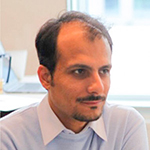
Muhammad Al-Waeli
Muhammad Al-Waeli is a Ph.D. candidate in management focusing on leadership and reform in Iraq.

